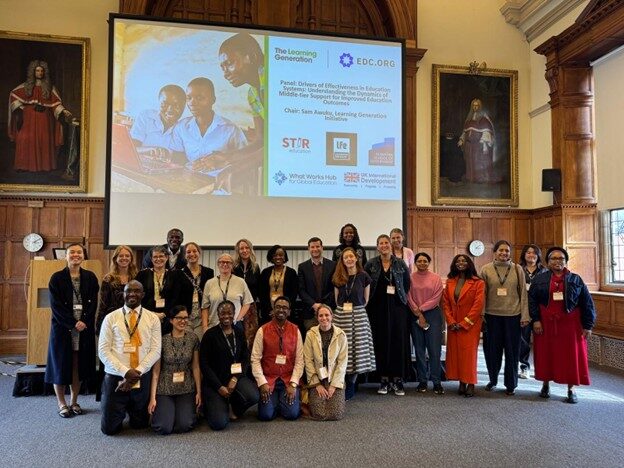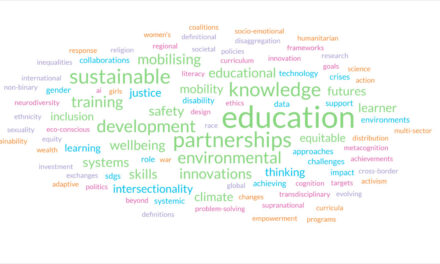This blog was written by Siddesh Sarma, Leadership For Equity. It is also published on the Leadership For Equity website. For the 2025 UKFIET conference, a record 37 individuals from 15 countries, including Siddesh, were provided with bursaries to assist them to participate and present at the conference. The researchers were asked to write a short piece about their research or experience of attending the conference.
What possibilities could emerge when experts and practitioners from the global education community gather in one of the world’s oldest centres of learning, at a moment of planetary crisis?
I arrived in Oxford for the UKFIET 2025 conference hoping to explore questions I continue to engage with in my work: teacher development, policy frameworks, and middle-tier reform in public school systems. But from the moment I stepped off the bus and into the hallowed halls of Oxford, I could feel a quiet shift. I had expected it to be just another education conference with its usual panels full of mutual backslapping and busy networking in between and after sessions. While there were bits of that, I can now say that it was something more layered. It was a space which did not shy away from problematising itself and creating a sense of urgency around global issues in education, without holding back on account of political correctness.
We gathered to ask what education, and research therein, can or ought to be: not just in classrooms or policies, but in a world riven by war, displacement, authoritarian populism, and climate collapse. In Oxford, the ghosts of the past were all around us. But so were the children of the present, and the questions they are waiting for us to answer.
First, the magic of Oxford
I must begin with a confession: for the first two days, I was thoroughly distracted by Oxford’s gorgeous architecture and the sheer fact of being in the same space as so many I have long admired. The bookshops, spires, pubs, and dining halls all felt lifted from a historical novel or Hogwarts itself.
Oxford, with its grand keep-off-the-grass quadrangles and centuries-old colleges, is a place that takes pride in its roots—and carries it well, despite its problematic past. As a citizen of an erstwhile British colony, despite all its symbols, it still evokes a huge sense of pride and accomplishment for simply being there. I was thrilled to be put up at the New College (fairly recent, having been built in 1379). I enjoyed being greeted by a furry cat near the (secret?) garden gate on the way to the much newer Examination School (1882) halls, where all the sessions were held.
Thanks to the generous support of the UKFIET Bursary Committee, I had my Hogwarts letter, or my hitchhiker’s guide. It felt like an exchange into a parallel academic universe, with equal parts of magic and rigour, with awe never far from intellectual curiosity.
Then, the keynotes that reframed everything
The conference didn’t waste any time getting to business and opened with a confrontation in the best sense. The keynote by Assistant Professor Ahmed Kamal Junina of Al-Aqsa University, Gaza, alongside Professor Yusuf Sayed from the University of Cambridge, framed the field as one in crisis.
A statistic shared in that room will haunt me for a long time: 28 children are killed every day in Gaza. That’s one classroom—gone—every single day.
I asked myself: What does ‘learning loss’ mean in this context? What does ‘capacity-building’ or strengthening public schools even look like when lives and existence itself are at stake?
Professor Sayed urged us to interrogate what we are researching, who is it for, and what is it doing in the world with all that is happening today. By seeing poverty alleviation and human development as urgent areas for researchers and policymakers, I found myself unlearning the privilege of believing research and learning were valuable simply for their own sake.
I was definitely sitting with discomfort as I heard the accurate yet provocative three broad areas presented by Professor Sayed as the main crises affecting education:
- Populism and right-wing politics, which threaten to turn education into a tool for exclusion rather than liberation.
- Climate change, which is reshaping the very infrastructure, timelines, and relevance of learning.
- Conflict, where schools and students become deliberate targets, and where education is not just disrupted, but systematically dismantled, resulting in ‘educide or scholasticide’.
So many new ideas to contend with! As I sat listening, I realised how easy it is to work in silos; to become so immersed in one’s own sub-sector that the broader developments and nuances can go unnoticed. The keynote definitely cracked open that insulation for me and helped me go beyond my comfort zone in attending sessions and interacting with people.
Taking in the present
For an aspiring academic long-immersed in the practitioner’s sphere of an education nonprofit, the intellectual vigour of the various sessions served as a formidable and welcome re-engagement with scholarly discourse, briefly bridging the theory-practice divide for me. I was struck by the resonance of insights emerging from diverse African contexts, even as I noted the contrasts in approach within neighbouring South Asian systems such as Pakistan. Rather than offering a session-by-session account, I will instead highlight a few particularly noteworthy discussions:
- Learning about the juxtaposition of the ASER FLN work with political constituencies led by Baela Jamil and her team was beyond fascinating.
- Learning about the tensions between the federal and local government actors and how they impact the middle tier in education systems was great as well. Please look up work and presentations by Sheena Bell, Onyinye Nkwocha, Modern Karema Musiimenta, Abhinav Ghosh, and by researchers from Central Square Foundation.
- Reflecting on who pays and sets the parameters for education reform from the work of leading scholars from Oxford Policy Management and Cambridge Education was insightful as well.
An unexpected workshop that opened my mind to new futures
Between panels, I stepped into a session on relational ecologies and epistemic justice, co-hosted by inclusive and forward-thinking researchers Dr Prachi Srivastava, Professor Leon Tikly, Dr Keith Holmes, Professor Catherine Odora Hoppers, D. Aleem Bharwani, and D. Moira Faul. The enigmatic title had first caught my eye, but the provocation that followed was unforgettable. We were asked to reflect on how knowledge is produced, whose voices are amplified, and whose experiences are routinely marginalised. The phrase ‘relational ecologies of knowledge’ stayed with me, surfacing questions about methodological imperialism, impact, and rigour. It was an intellectual and emotional nudge I needed, especially as I consider future literacy in India.
My panel: Middle tier, centre stage
I finally came to the part where I was to shift from my own role of an engaged listener to that of a speaker, offering my own perspectives to the discourse. I was a bit tentative, what with it being the final session before the closing plenary, wondering about waning audience energy and attention span at the end of three long days of intellectual and social engagement. Nevertheless, I ventured forth.
I had the privilege of presenting on a panel titled ‘Drivers of Effectiveness in Education Systems’, organised by the What Works Hub for Global Education, alongside exceptional colleagues from STiR Education (Uganda), Learning Generation Initiative (South Africa) and What Works Hub for Global Education (UK).
I shared a case study from Leadership for Equity (LFE) and our eight-year journey of strengthening the middle tier in Indian public education: the officers and institutions that sit between state policy and school-level implementation. I spoke about the relational drivers and the need to start from a ‘high demand’ state and slowly nudge the system, through relationships, towards responding to ‘high need’ initiatives.
There was something surreal about standing in a centuries-old room, speaking of cluster resource persons, district mentors, and academic leadership in Maharashtra, Haryana, and Andhra Pradesh, and having it resonate with researchers and implementers from across continents.
Dr Yue-Yi Hwa from the University of Oxford offered a brilliant synthesis: middle-tier actors must be Equipped, Connected, Informed, and Empowered.
Dr Samuel Awuku chaired the panel with clarity, and Kholosa Nonkenge, representing South Africa’s Department of Basic Education, grounded the discussion in the lived complexities of government reform.
As summarised by Deborah Kimathi, we kept returning to four ideas:
- Ownership: Who is really driving reform, and are middle-tier actors empowered to shape it?
- Motivation: What incentives move people to act, or not act, within systems?
- Mindset: Can we design for cultural change, not just structural tweaks?
- Relationships: Implementation is relational, not transactional.
If the middle tier was once invisible in global education discourse, it certainly is not anymore. This is thanks to the group of 15-18 presenters from around the world who did their bit to focus on ‘implementation science’ and drive urgency to work on this aspect of scaling educational reform.
Food for future thought?
As the conference wound down, I realised what had shifted in me. Two concepts now anchor my thinking:
- ‘Edu-cide’: The deliberate destruction of education systems in times of war. A term I had never heard before, but now cannot un-hear.
- ‘Epistemic justice’: Not just a lofty ideal, but a necessary lens for how we collaborate, evaluate, and learn across contexts.
This conference did not offer tidy answers. Instead, it offered space to think with others and to sit with discomfort, dissent, and possibility. For my work in middle-tier-led education reform, I sense that the global appetite is clearly growing. I return with more conviction and, perhaps most importantly, a keener sense of responsibility.
Time to get back to work.


